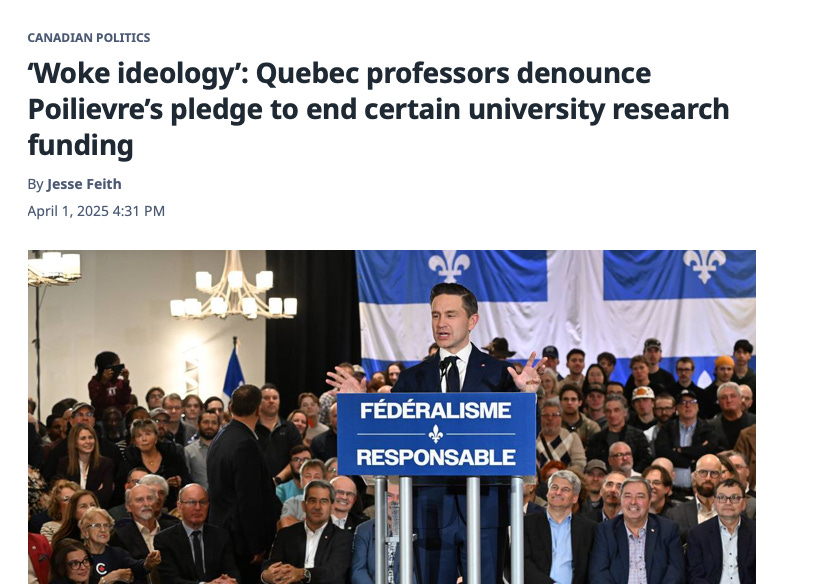Why the 2025 Canadian Federal Election Could Define a Generation
We are not in normal times. Here are 3 reasons why this election promises to be the most important election of our lifetimes.
The upcoming Canadian federal election isn’t just another political contest — it’s a key moment for the future of Canadian democracy, academic freedom, and national sovereignty.
In this issue, I’d like to focus on three existential issues, and highlight why your engagement in this election could help reshape Canada’s future in the months and years to come.
1. The Notwithstanding Clause: A Threat to Our Constitutional Rights
The Conservative Party of Canada, under Pierre Poilievre, has pledged to use the notwithstanding clause (Section 33 of the Canadian Charter) to pass laws that would override Charter rights, starting with sentencing reforms for mass murderers.
While Poilievre has framed this idea as a public safety measure, this actually sets a dangerous precedent. Already, Quebec, Alberta, and Ontario Premiers have used the notwithstanding clause to override fundamental freedoms, targeting our most vulnerable communities: minority and religious groups, LGBTQ+ individuals, and the homeless.
The usage of the notwithstanding clause by a federal government — which oversees immigration, national security, transportation, and other issues directly linked to your fundamental freedoms — would pose a serious threat to Canadian democracy.
Poilievre’s additional pledge to force individuals struggling with addictions into mandatory treatment — overriding their right to liberty and personal security — already suggests that — were he Prime Minister — he would expand the usage of the notwithstanding clause to target any group or community he chooses.
Why this matters: The notwithstanding clause was intended by Canada’s founders as a last resort, but its recent normalization risks eroding our fundamental rights. Legal experts have argued that allowing consecutive life sentences for murderers, while it initially seems reasonable, could radically politicize the justice system and invite broader misuse against other individuals and groups perceived as “threats to our communities”.
Broader implications: If governments routinely override Charter protections, Canada’s reputation as a rights-based democracy could seriously unravel. While both NDP leader Jagmeet Singh and Liberal leader Mark Carney have condemned Poilievre’s approach as a “dangerous step” toward authoritarianism, we must do more to publicly denounce ideas that weaponize the notwithstanding clause against vulnerable groups and communities.
2. “Anti-Woke” Policies: Undermining Universities and Academic Freedom
You may have noticed that last week the Conservatives updated their platform to “end the imposition of woke ideology” in federal funding for university research. This targeting of equity, diversity, and inclusion (EDI) initiatives mirrors U.S.-style culture wars, which has directly impacted the work of Canadian researchers. Right now, the Trump administration is threatening Canadian researchers that unless they scrub certain terms from their research projects, they will lose U.S. funding completely.
Attacks on academic integrity: Many stakeholder groups in Canada have sounded the alarm about this potential threat to academic integrity. The Canadian Association of University Teachers (CAUT) warns that politicizing research funding jeopardizes Canada’s ability to address global challenges, including foreign interference threats, worsening forest fires, and public health emergencies.

A chilling precedent: Already, this notion has spooked many universities. The University of Alberta has already gutted their EDI frameworks under political pressure, while scholars like Marc Spooner from the University of Regina have argued that rejecting EDI undermines evidence-based policymaking and echoes Stephen Harper’s war on science (2006-2015) that devastated our research capacity.
3. The Trump Factor: Existential Threats to Our Sovereignty and Democracy
Donald Trump’s administration now poses an existential threat to Canada’s economy, security, and democracy, issuing serious threats of annexation, initiating an economic trade war, and cutting millions in research funding to Canadian researchers.
These threats are more than rhetorical bluster — they’re part of a broader assault on our values, and way of life.
Economic and security fallout: Trump’s tariffs are already starting to devastate industries reliant on U.S. trade (eg auto sector), while Trump’s disregard for NATO and pullback from climate agreements weakens Canada’s ability to combat environmental and security threats. In fact, many are now treating the U.S. as a source of hostile disinformation and a security risk.
Democratic corrosion: Trump’s attacks on media, courts, and electoral integrity in America have emboldened authoritarian tendencies across the globe. Experts are now warning that his influence could normalize similar threats to Canadian democracy, particularly given the alignment of several Conservative policies with Trump’s agenda.
The Stakes for Voters
This election isn’t merely about partisan preferences — it’s a referendum on what kind of Canada we want to be:
A Canada that safeguards Charter rights from political threats, or one where constitutional protections depend on populist majority rule.
A Canada that invests in inclusive, independent research, or one that silences marginalized voices in academia and promotes ideology over evidence.
A Canada that asserts its sovereignty against foreign interference, or one that caves in to economic and ideological bullying.
This issues are serious and should be taken into account as we head to the polls tomorrow. How we, as Canadians, respond will determine whether the country remains a beacon of democracy or crumbles under the pressure of divisive politics. As federal leaders clash over Canada’s direction, we, as voters, face a choice that could echo well beyond 2025.
In summary
This election isn’t just important — it’s existential.
The outcome of tomorrow’s vote will define Canada’s commitment to democratic governance, academic freedom, and national sovereignty in an era of rising threats and challenges.











